The Arab world's first ladies of oppression
guardian.co.uk,
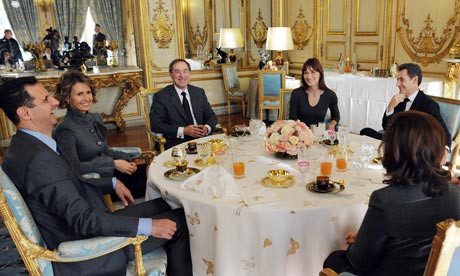
Only days after the lunch, a desperate Tunisian vegetable seller would set himself alight, sparking the first revolution of the Arab spring. Already, as the Sarkozys' butlers served the Assads crystal glasses of freshly squeezed juice from silver platters, there was unease among certain diplomats about the French president schmoozing the ruler of an oppressive dictatorship known for torture, brutality and political prisoners. But Nicolas Sarkozy, an expert on the importance of photogenic wives in politics, saw Asma as his insurance policy. "When we explained that this was the worst kind of tyrant, Sarkozy would say: 'Bashar protects Christians, and with a wife as modern as his, he can't be completely bad,'" the former French foreign minister Bernard Kouchner later confided to journalists.
Now, after 11 months of bloody repression of the pro-democracy uprising in Syria, with thousands dead and tens of thousands of refugees spilled over Syria's borders, Asma's careful public-relations strategy as the gentle British-born face of the regime has crumbled. When she appeared smiling and immaculately dressed on Sunday alongside her husband to vote in a referendum on a new constitution, it only deepened opposition accusations that she has become a modern-day Marie-Antoinette. The row over a shockingly fawning, lengthy puff-piece in American Vogue last year depicting Asma's Louboutin shoes and charity work, as well as a recent appearance at a rally hugging her children in support of her husband and an email to the Times explaining her backing of him, has reopened the debate about the role of dictators' wives in the Arab spring.
"Every revolution has its Lady Macbeth," sighed one Middle East expert in Paris. The dictators' wives are all very different, united by the varying degrees of hatred they inspired, eye-watering fortunes, expensive wardrobes and often a state-sanctioned so-called "feminism" or, like Asma al-Assad, charity work as a public distraction against the brutal realities of the regime.
Leila Trabelsi, the politically ambitious wife of Tunisia's Zine El-Abidine Ben Ali, was easily the most detested, a monstrous symbol of nepotism and corruption, whose embezzlement of state wealth made Imelda Marcos's nearly 3,000 pair of shoes seem trifling. Trabelsi sparked the sense of injustice that flamed the revolution, keeping a mafia-style hold of the nation's economy, siphoning off riches to her and her husband's family, who were thought to control 30-40% of the economy, running everything from customs to car-dealers, supermarket chains and banana importations. She and her relatives are accused of ordering people from their homes if they wanted their land, confiscating their businesses if they thought they could profit from them. Trabelsi took archaeological artefacts to decorate her palace rooms while her daughter and son in law flew in ice-cream from St-Tropez for dinner parties.
Described as the woman who sparked the Arab spring, Trabelsi, who liked to be called "Madame La Présidente", inspires dread in the public imagination. A book by her butler recently described how she would ritually sacrifice chameleons to supposedly cast spells over her husband and how she punished one cook by plunging their hands into boiling oil. From exile in Saudi Arabia with her husband Ben Ali, the couple are seeking to appeal their sentencing in absentia last year to 35 years in jail accused of theft and unlawful possession of large sums of foreign currency, jewellery, archaeological artefacts, drugs and weapons – the first of several cases against them. After they fled, $27m (£17m) in cash and jewels, guns and 2kg of drugs were found at one of their lavish palaces outside Tunis.
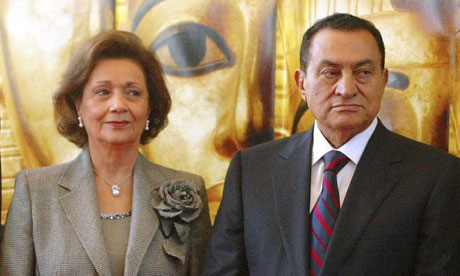 Suzanne and Hosni Mubarak in 2004, when the latter was still president of Egypt. Photograph: Sipa Press/Rex Features
Suzanne and Hosni Mubarak in 2004, when the latter was still president of Egypt. Photograph: Sipa Press/Rex Features Meanwhile, Suzanne, the half-Welsh wife of Egypt's Hosni Mubarak, benefited from a fortune of billions in a country where around 40% of the population lives on less than £1.20 per day. She is now being investigated alongside her husband on allegations of crimes against the state and has relinquished disputed assets worth nearly £2.5m. Before the Egyptian revolution, whole newspaper pages were "allocated" to cover Suzanne's "charitable engagements" and "actions" for women. But like Trabelsi, this was a facade. The Tunisian first lady headed several official women's rights bodies, awarding herself prizes for feminism, while grassroots feminist democracy campaigners saw their members regularly beaten in the street by the regime's police and political prisoners were raped in torture cells. Similarly, Suzanne Mubarak would jet off to meet Arab leaders' wives to talk about women's issues while independent women in Egypt were being heavily repressed.
Suzanne, 71, whose father was a doctor and mother a nurse from Pontypridd, married Mubarak when she was 17 and he was a 30-year-old army officer. One account described her lying weeping on the palace floor, refusing to leave during the uprising. She influenced government appointments, and was believed by some to have been clinging to power by pushing for her son to take over from his father.
In Libya, Colonel Gaddafi was perhaps more famous for his Ukrainian nurse and female bodyguards than his wife. But Safia Farkash, his second wife, a nurse when she met him, was still vastly wealthy, a symbol of public money siphoned off into the family's pockets. His daughter Aisha, once described as the Claudia Schiffer of the region, a lawyer and part of Saddam Hussein's defence team, was held up by her father as a model of modern women's rights. Safia and Aisha fled over the Algerian border during the uprising. Mostly low-profile, Safia Gaddafi nonetheless occasionally attempted, particularly to the western media, to play the role of a simple wife and mother, humanising her husband. In the 1980s, she told the US press she was someone who was afraid of even a "dead chicken", saying of Gaddafi: "If I thought he was a terrorist, I would not stay with him and have children with him. He is a human being."
But the western media's apparent thirst for a new, younger generation of glossy magazine-style, modern, educated Middle Eastern first ladies along the line of Jordan's Queen Rania (ranked third most beautiful woman in the world by Harpers and Queen in 2005) seemed to have been sated by the arrival of Syria's Asma al-Assad in 2000. "Curiously, the Assads before the revolution were seen as a modern young couple," says Karim Bitar of Paris's Institute for International and Strategic Relations. Then a new "cold, calculating" face emerged.
 Leila Trabelsi, wife of former Tunisian president Zine El-Abidine Ben Ali in 2010. Photograph: Hassene Dridi/AP
Leila Trabelsi, wife of former Tunisian president Zine El-Abidine Ben Ali in 2010. Photograph: Hassene Dridi/AP Asma was born in London to Syrian parents, a Harley Street surgeon and a diplomat, and raised in a pebble-dashed semi in Acton, going to a Church of England primary school and smart private secondary before taking a degree in computer science at King's College London and a banking job for JP Morgan. She was a childhood friend of the Assads, 10 years younger than Bashar, who had come to London to study as an eye surgeon. She was also a Sunni Muslim whose father hailed from Homs, unlike Bashar's minority Alawite clan. All this could be used, by a skilled PR team, as the soft face of a would-be reformist regime. "Who would choose Harvard over love?" Asma told one interviewer when asked if she hesitated about leaving her banking career and an MBA to become first lady of Syria. She said she would use her professional financial experience and "a critical judgment, being able to work under enormous pressure" in her new role running NGOs. In Damascus, she and her husband liked to be seen dining out, driving themselves around, a carefully constructed image of a carefree young couple who preferred the luxury of a vast apartment to the luxury of a palace. In Paris, she became famous for delivering a long speech on culture without notes while Christine Lagarde, now head of the IMF, looked on admiringly. In a 2009 CNN interview Asma condemned Israel's offensive on the Gaza strip as "barbaric" and "as a mother and a human being" demanded its end. "This is the 21st century. Where in the world could this happen? Unfortunately it is happening," she said in her measured, almost mechanical voice, with its clipped London tones. Those words have come back to haunt her.
The pinnacle of Asma's international media charm offensive was a gushing piece in last March's American Vogue, just before the Syrian uprising began and was met with a crackdown. The article has now mysteriously disappeared from the magazine's website. Described as a "rose in the desert", "the freshest and most magnetic of first ladies", Asma, dressed in jeans, heels and a T-shirt with "Happiness" emblazoned on the back, describes how her home, a triplex apartment, is run "on wildly democratic principles" – seemingly far from the brutal one-party state oppression going on outside.
Looking at her three children, she says: "We all vote on what we want, and where." Pointing to the dining room chandelier, which is constructed from cut-out comic books, she says: "They outvoted us three to two on that." Against a backdrop of designer bags, private jets and SUVs, Asma tells Vogue her "central mission" is "to change the mind-set of 6 million Syrians under 18", encourage them to engage in what she calls "active citizenship". Meanwhile pro-democracy activists were being rounded up and tortured.
In the Assad's flat, a grid is drawn on a blackboard, with ticks for each member of the family. "We were having trouble with politeness, so we made a chart: ticks for when they spoke as they should, and a cross if they didn't." There is a cross next to Asma's name. "I shouted," she confesses. "I can't talk about empowering young people, encouraging them to be creative and take responsibility, if I'm not like that with my own children." Her husband was attracted to studying eye surgery "because it's very precise […] and there is very little blood". Driving themselves around in a city seemingly permeated by secret police, she describes the joys of not having an imposing presence of bodyguards, delighting in how Brad Pitt and Angelina Jolie, while being driven to dinner by the Assads, marvelled at their seeming lack of security guards.
After the Vogue interview, as the regime's bloody crackdown continued, Asma went quiet. Out of the blue, her office emailed a statement to the Times last month after it ran an article asking: "What does Assad's wife, an intelligent, educated woman raised in liberal Britain and seemingly dedicated to good works, think of the evils being perpetrated daily across Syria […]? Is Asma Assad, 36, indifferent to the suffering being inflicted on her fellow Sunnis by her husband's Alawite henchmen – or appalled? Has Syria's Princess Diana become its Marie-Antoinette?" Her office's statement said: "The president is the president of Syria, not a faction of Syrians, and the first lady supports him in that role." It added: "The first lady's very busy agenda is still focused on supporting the various charities she has long been involved with and rural development as well as supporting the president as needed. These days she is equally involved in bridging gaps and encouraging dialogue. She listens to and comforts the families of the victims of the violence." Just before, she had appeared grinning from ear to ear with two of her children to support her husband as he spoke at a pro-regime rally, but did not speak herself.
Jane Kinninmont, senior researcher on the Middle East at the Chatham House thinktank in London, says the leaders' wives in the Arab spring were of clear "symbolic importance", though Asma al-Assad is different to Tunisia's Leila Trabelsi, who had been a key source of unrest. "In Syria, the resistance is very focused on the regime," says Kinninmont. "In the past, Bashar's wife was something of an asset for him: young, charming, international, helpful to soften his image. Now that has fallen away. Vogue last March was a terrible error of judgment. The timing was particularly bad, but it was part of a wider trend for quite fluffy portraits of dictators' wives as glamorous woman, saying 'look how good our charity work is'. Glamorous, well-educated, well-dressed: the western media still falls for this pseudo aristocratic clap-trap. It's all part of trying to give a pretty face to a regime."
Kinninmont says the email from Asma's office to the Times was "far too late" and came across as ridiculous. "Saying how she spent time comforting the families of victims of violence just seemed out of touch."
In almost all Arab countries it is illegal to directly criticise the head of state, Kinninmont points out, adding that though sometimes people might dislike the wives personally it can also at times be a substitute for criticising the rulers. "In terms of what it is permissible to say, it's a bit easier to criticise the wife," she says. Sometimes a wife could be the focus of criticism themselves, or a softer target. But Kinninmont also blames the western media for creating a media bubble of glamorous first lady figures.
Asma al-Assad, at the start of her photogenic role as first lady, tried to keep a distance. Asked by NBC in 2007 about her role as leader's wife, she said in her icy, careful tone: "That's what I do, it's not who I am. At the end of the day I'm the same person as I was before I married the president, and I'll be the same person hopefully going forward."
guardian.co.uk

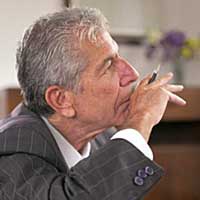 plague in his house. Why? Perhaps his fear has rattled his confidence in his mind. But another explanation (always another explanation!) was given. The point of this locution, so unfamiliar in the biblical universe but so familiar in the human universe, is, in the words of an ancient rabbi, to "teach your tongue to say: ‘I do not know’".
plague in his house. Why? Perhaps his fear has rattled his confidence in his mind. But another explanation (always another explanation!) was given. The point of this locution, so unfamiliar in the biblical universe but so familiar in the human universe, is, in the words of an ancient rabbi, to "teach your tongue to say: ‘I do not know’". Cohen has always been fascinated by his own smallness: he does not rebel against it so much as he rebels within it. His art has been a long and invigorating endeavor to coax significance out of insignificance. He never introduces anything large or anything lasting except wryly, as if to say: here is what he who does not know knows. And Dear Heather is a perfect document of this brilliant humility. Here the form has caught up with the philosophy. The record is a notebook, a scrapbook, a sketchbook, a miscellany of ideas and moods and observations and diversions -- the definitive declaration of Cohen’s glad loss of interest in the definitive. The temper here is provisional, digressive, incomplete, quiet, experimental, generous, artisanal. Dear Heather is located in the middle of the work and in the middle of the world. Cohen sings, but not always; sometimes he lets others sing (especially Anjani Thomas, in whose preternaturally gorgeous voice Cohen has found the most angelic of all his "angels"), and sometimes he speaks, his own words or the words of others. He wishes to give what he loves a hearing. Even in sadness, he comes to praise.
Cohen has always been fascinated by his own smallness: he does not rebel against it so much as he rebels within it. His art has been a long and invigorating endeavor to coax significance out of insignificance. He never introduces anything large or anything lasting except wryly, as if to say: here is what he who does not know knows. And Dear Heather is a perfect document of this brilliant humility. Here the form has caught up with the philosophy. The record is a notebook, a scrapbook, a sketchbook, a miscellany of ideas and moods and observations and diversions -- the definitive declaration of Cohen’s glad loss of interest in the definitive. The temper here is provisional, digressive, incomplete, quiet, experimental, generous, artisanal. Dear Heather is located in the middle of the work and in the middle of the world. Cohen sings, but not always; sometimes he lets others sing (especially Anjani Thomas, in whose preternaturally gorgeous voice Cohen has found the most angelic of all his "angels"), and sometimes he speaks, his own words or the words of others. He wishes to give what he loves a hearing. Even in sadness, he comes to praise. The record revels in its own lack of monumentality. No emotions are exempted from its insistence upon the reality, and the beauty, of the ordinary. Consider "On That Day", Cohen’s contribution to the mourning for September 11, 2001. On the occasion of "the day they wounded New York", he has written a ditty. It is all of two minutes long, and it includes the unplangent twanging of a Jew’s harp. But there is no blasphemy in this simplicity. Not at all. The song is deeply affecting because of its refusal of the temptation of magnitude, and also because of its argument that one may respond to evil with madness or with service. Compare this unlikely commemoration to the bombastic arena-rock threnodies that were provoked by the catastrophe in New York and you will have a lesson in grief’s integrity. Or consider "Dear Heather", the wickedly amusing title track. Here it is not sorrow that is translated into the idiom of the actual, it is desire. A woman walks by a man and undoes him so completely that he must teach himself again to spell. Cohen is tickled by the banality of his own lust. Where anguish once was there now is silliness. The longing persists, but the slavery is over. And the evidence of inner freedom is everywhere in Dear Heather. It is a window upon the heart of an uncommonly interesting and uncommonly mortal man, a man with the stomach for transience.
The record revels in its own lack of monumentality. No emotions are exempted from its insistence upon the reality, and the beauty, of the ordinary. Consider "On That Day", Cohen’s contribution to the mourning for September 11, 2001. On the occasion of "the day they wounded New York", he has written a ditty. It is all of two minutes long, and it includes the unplangent twanging of a Jew’s harp. But there is no blasphemy in this simplicity. Not at all. The song is deeply affecting because of its refusal of the temptation of magnitude, and also because of its argument that one may respond to evil with madness or with service. Compare this unlikely commemoration to the bombastic arena-rock threnodies that were provoked by the catastrophe in New York and you will have a lesson in grief’s integrity. Or consider "Dear Heather", the wickedly amusing title track. Here it is not sorrow that is translated into the idiom of the actual, it is desire. A woman walks by a man and undoes him so completely that he must teach himself again to spell. Cohen is tickled by the banality of his own lust. Where anguish once was there now is silliness. The longing persists, but the slavery is over. And the evidence of inner freedom is everywhere in Dear Heather. It is a window upon the heart of an uncommonly interesting and uncommonly mortal man, a man with the stomach for transience.  the scene around me. In the past, especially on his last album, Ten New Songs, Leonard Cohen often seemed to push his songs towards darkness and silence, the place where everything gives out. Indeed, the power of that record seemed to me to lie partly in its singleness, its unity of tone, the songs flowing one into the other with a grave, contained intensity. This was the beauty of a small cabin beside a Zen meditation-hall high up in the mountains.
the scene around me. In the past, especially on his last album, Ten New Songs, Leonard Cohen often seemed to push his songs towards darkness and silence, the place where everything gives out. Indeed, the power of that record seemed to me to lie partly in its singleness, its unity of tone, the songs flowing one into the other with a grave, contained intensity. This was the beauty of a small cabin beside a Zen meditation-hall high up in the mountains.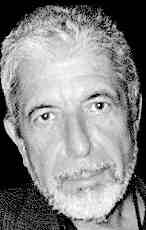 Offerings for a Sunday morning, you could say, at home in the sun.
Offerings for a Sunday morning, you could say, at home in the sun.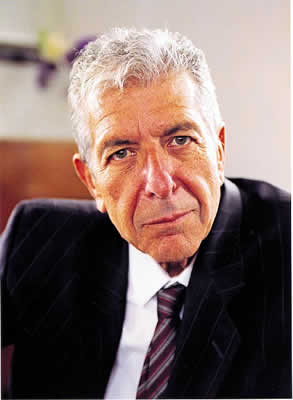 unexpected rhyme, he surprises us by giving us just the word we expect. And often the words more or less dissolve, as the singer experiments with chant, or incantation, the place where music becomes something more than music, closer to prayer or ritual recitation. "And your legs white from the winter."
unexpected rhyme, he surprises us by giving us just the word we expect. And often the words more or less dissolve, as the singer experiments with chant, or incantation, the place where music becomes something more than music, closer to prayer or ritual recitation. "And your legs white from the winter."